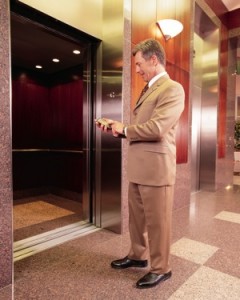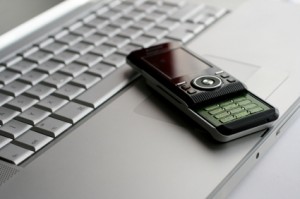 I had the pleasure of speaking to a communications class offered to MBA students of New York University’s Leonard Stern School of Business. To my surprise, only two of the thirty students indicated plans for launching their own businesses after graduation. But while some choose entrepreneurship, others have entrepreneurship chosen for them. Consider the Self Employment Assistance Program of the U.S. Department of Labor, which allows approved applicants to work full-time on launching their own businesses while collecting unemployment benefits. This program arose from the recognition that the corporate sector is unlikely to generate growth sufficient to replace the eight million jobs that Americans have lost since the financial crisis in the fourth quarter of 2008. Given the risks inherent in entrepreneurship, this isn’t the answer for everyone, but it is a creative policy solution to a very serious labor market problem.
I had the pleasure of speaking to a communications class offered to MBA students of New York University’s Leonard Stern School of Business. To my surprise, only two of the thirty students indicated plans for launching their own businesses after graduation. But while some choose entrepreneurship, others have entrepreneurship chosen for them. Consider the Self Employment Assistance Program of the U.S. Department of Labor, which allows approved applicants to work full-time on launching their own businesses while collecting unemployment benefits. This program arose from the recognition that the corporate sector is unlikely to generate growth sufficient to replace the eight million jobs that Americans have lost since the financial crisis in the fourth quarter of 2008. Given the risks inherent in entrepreneurship, this isn’t the answer for everyone, but it is a creative policy solution to a very serious labor market problem.
Archive for the ‘Communications’ Category
Crisis Communications for Small Business
Tuesday, May 4th, 2010Mobile Data Outage Disrupts Small Businesses
Sunday, August 2nd, 2009AT&T experienced a substantial mobile data area-wide EDGE/3G outage in the Northeast and Midwest, which disrupted iPhone service as well. If your business was affected and you ask your AT&T service representative, the company will credit $25 to your account. But be sure to request the credit, because it appears that the company is not volunteering the credit. The way to minimize disruption from such inevitable mishaps is to have redundant systems in place to deal with third-party failure. I have two separate wireless providers for my business, such that if one fails, I use the other. For a relatively modest fee, I build in some contingency for mobile data services, which can be a lifeline for small businesses.
Cities Reconsider Emergency Communications
Saturday, July 11th, 2009USA Today reports that cities are reconsidering their plans to alert residents to disaster threats via text messages owing to unanticipated problems with this form of communication. Last June, 100,000 residents of Fort Collins, Colorado did not receive tornado alerts delivered to them via cell phone and e-mail messages. In addition to technical failures, such as this one, the expense of this form of alert can be substantial for cities that are under increasing financial pressure.
To the USA Today report, I can add a concern of my own – information overload. New York City’s Office of Emergency Services offered an SMS text message alert system for disasters happening in New York City. I signed up for the service, which was free, believing that advance notice of any disruptions would help us to plan our work and commutes to and from the office. I soon terminated my subscription. The problem was information overload. I was receiving notices of emergency calls such as EMS being called to a site where a body was found floating in the Hudson River and other such events which, while pertinent to the emergency responders, are not relevant to us. After receiving several hundred such messages each day, I began to appreciate that any messages that would be pertinent to us would be lost in the clutter. So I now rely on weather and other alert systems through the news radio. I find it to be more efficient for the limited resources, particularly in terms of attention bandwidth, of a small business.
Dial Another Tax
Tuesday, June 16th, 2009According to the Wall Street Journal, the Internal Revenue service issued a notice this week to advise of stricter enforcement of taxation on employer-provided fringe benefits, specifically, mobile telephones. Pursuant to a 1989 law, employees who use company-paid mobile phones for personal calls are required to impute the cost of those calls as income on which they must pay federal tax. But, as is the case with frequent flyer miles earned on business travel, employees rarely do so. Now with budget deficits stretching out for generations, the federal government is desperate for tax revenues. The IRS proposes that employers assign 25% of an employee’s annual telephone expense as a taxable benefit. Employees could avoid that tax liability if they could demonstrate that they use personal mobile phones for personal calls made during work hours. Alternatively, employers could use a statistical sampling to calculate the proportion of employees’ cell phone use that is personal and assess the tax accordingly. This tax will likely cost more in compliance than it will yield in revenues. As a recognition of the compliance costs, large corporations are already debating the idea of canceling employer-paid mobile phones and requiring employees to pay for their own phones and submit invoices to the company for reimbursement of work-related calls. What a great idea – shift more of the cost of employment and cash flow strain on workers whose taxes are increasing and who cannot keep up with inflation! I don’t like that one, particularly since mobile phones are critical to disaster preparedness and recovery. I want to maintain some quality control over how those phones are selected and maintained. Let’s hope that the wireless companies are successful in their lobbying efforts to kill this proposal.
E-Mail Service Outage
Tuesday, February 24th, 2009Last night, many users lost access to Gmail, the popular e-mail service offered by Google. According to Google, the problem is now fixed, but it is unclear what gave rise to the problem and if it will recur (this is not the first service outage for Gmail.)
For small businesses, redundancy is critical and as Gmail is free, it makes sense to use another free email service to send out important messages when the primary service is disrupted. I would be more likely to use such a free service as my secondary channel of communication, since many services will block such messages as likely spam. And then, of course, I have a third free e-mail service, as contingency for contingency!
How to Lose 41 Pounds Without Cutting Calories
Friday, February 13th, 2009Did you know that the average American receives 41 pounds of junk mail every year? If you can reduce the volume of junk mail you receive, you and the environment will benefit. The less junk mail you receive, the less time you have to waste sorting through unessential communications and the more time you will have to focus on what is truly important to you. When I lived in Switzerland, people would put stickers on their mail box with the statement “Bitte, keine reklame!” (meaning, “Please, no advertisements!”). The postal worker could not then put sales circulars, catalogs or other unsolicited junk mail in the post boxes so marked. Such mail would be returned to the sender at his expense. I hope that we can soon pass legislation in the U.S. providing such consumer protections. Meanwhile, there are steps that you can take to reduce your volume of junk mail. The Center for a New American Dream even offers a kit to do it for you, or you can sign up for Catalog Choice to opt out of mailers. In Prepare for the Worst, Plan for the Best: Disaster Preparedness and Recovery for Small Businesses (Wiley, second edition, 2008), I offer some suggestions to contact credit card companies and mailing list providers to substantially reduce the volume of unwanted mail you receive. It is bad enough receiving junk mail in your office during normal business operations, but this is certainly a burden you don’t want to have should you find yourself displaced and temporarily operating from a remote location in the event of a disaster.
Dial “C” for Caution
Thursday, February 12th, 2009We are all sensitive to the need to protect confidential business data on our laptop computers, but have you given any thought to what is stored on your cell phone? Just a few weeks ago a man in New Zealand paid $10 for a used MP3 player and found it preloaded with U.S. military records and personnel data for troops stationed in the Middle East. In December, an old BlackBerry was sold for $20 at a garage sale of the McCain Presidential Campaign. It was found to be preloaded with sensitive Republican donor information, emails, and more. Unfortunately, incidents such as these, while embarrassing, are all too common. Don’t let them happen at your small business.
Regenersis processed over two million mobile phone handsets in 2008 and last December, during a random sampling of 2,000 recycled mobile phones, found that 99% of them stored sensitive data such as banking information and confidential e-mail messages. The average mobile phone is replaced every 18 months; if you do not clear these handsets of data before you recycle or dispose of them, you may jeopardize the security of your small business. Of course, not all cell phones are recycled or donated once they are removed from service. In the U.S., over 700 million cell phones that are no longer actively used are stockpiled in homes or businesses, which also pose security risks.
Do not rely on the next user or the cell phone recycling firm to purge your data for you. It is safer to invest a minute or two to learn how to do a proper factory reset/hard reset on your phone, remove memory and/or SIM cards, check to make sure everything’s been wiped, and then dispose of your handset.
Do Not Reply to All
Monday, January 12th, 2009 The State Department suffered a recent embarrassment when it was disclosed that the main electronic communications system of the Department was nearly knocked out owing to what was, in effect, an internally originated denial of service attack. The root cause was traced to the practice of State Department employees selecting the “reply all” option to e-mail messages with very large distributions. This resulted in both an internal shutdown of sensitive electronic communications as well as needless abuse of the time of those who were copied on messages that they did not need to receive. We had addressed this topic, from the latter perspective, in both the earlier and current editions of Prepare for the Worst, Plan for the Best: Disaster Preparedness and Recovery for Small Businesses (Wiley, second edition, 2008). The recommendation put forward in that book was to reduce the “info-stress” caused by bombarding employees with unnecessary communications. Use some discretion in targeting your oral and written communications and watch productivity soar.
The State Department suffered a recent embarrassment when it was disclosed that the main electronic communications system of the Department was nearly knocked out owing to what was, in effect, an internally originated denial of service attack. The root cause was traced to the practice of State Department employees selecting the “reply all” option to e-mail messages with very large distributions. This resulted in both an internal shutdown of sensitive electronic communications as well as needless abuse of the time of those who were copied on messages that they did not need to receive. We had addressed this topic, from the latter perspective, in both the earlier and current editions of Prepare for the Worst, Plan for the Best: Disaster Preparedness and Recovery for Small Businesses (Wiley, second edition, 2008). The recommendation put forward in that book was to reduce the “info-stress” caused by bombarding employees with unnecessary communications. Use some discretion in targeting your oral and written communications and watch productivity soar.
But the State Department’s mishap is useful in that it reinforces a lesson about organizing your critical communications: this “reply all” practice interrupted critical communications in normal operations. Imagine how much worse the consequences would have been if the Department had been operating in a disaster recovery mode. That is another reason why you must streamline your communications. This incident was a nuisance to the State Department; it could be devastating to a small business, with far fewer resources to waste. And taking the State Department’s lesson one step further: be careful about how you store your e-mails online with file attachments, particularly when multiple parties within the company are copied on the same message. This redundancy puts an additional burden on your human and IT resources. Consider alternatives, such as the use of a wiki, instead. This will streamline your communications and reduce the risk of further disruptions.
You’ve Got (Too Much) Mail
Tuesday, October 21st, 2008IBM posted a podcast and report appropriate titled “You’ve Got (Too Much) Mail” that is worth checking out. It deals with the topic we called “info-stress” in the first edition of Prepare for the Worst, Plan for the Best: Disaster Preparedness and Recovery for Small Businesses. This is the phenomenon of being overwhelmed with unnecessary information through e-mails, facsimile messages, postal mail, telephone calls and other communication channels, such that you cannot claim time for what is truly important. What does this have to do with preparing for or recovering from a disaster? Should your small business be in disaster recovery mode, you will have to focus on the truly critical, so I advise you to weed out the info-spam time wasters now. You will benefit from an immediate improvement in productivity and reduced stress, even if disaster never strikes. IBM’s brief report contains some good suggestions.
Confirmation on FEMA Hotels for Those Displaced by Ike
Wednesday, September 17th, 2008In my blog entry on Sunday, I reported that I had spent some time as a guest on a live broadcast of KTRH News Radio in Houston dealing with some of the urgent needs raised by their listening audience in response to Hurricane Ike. Chief among these was the need for a list of the FEMA hotels for the transitional housing program. Listeners in the Houston audience called in to this radio program, one after the other, to report that they could not obtain information from FEMA about which hotels were participating in the program so that they could attend to their urgent needs for shelter. The anchor of the news program reported that FEMA had not updated its website for Texas since Hurricane Dolly. I found the list of FEMA hotels in Texas for the Gustav evacuees and was assured that this list was the same for those displaced by Ike. I posted the link to this list on my blog on Sunday, September 14 and made it available to the news director of KTRH so he could convey the information to his listeners who did not have Internet connections.
Three days later, today at 6:30 p.m. Wednesday, September 17, the Associated Press reported that FEMA had finally published the list of participating hotels for the transitional shelter program. It is, indeed the same list I had posted on this blog on Sunday and made available to the listeners of KTRH when I was a guest on their program.



